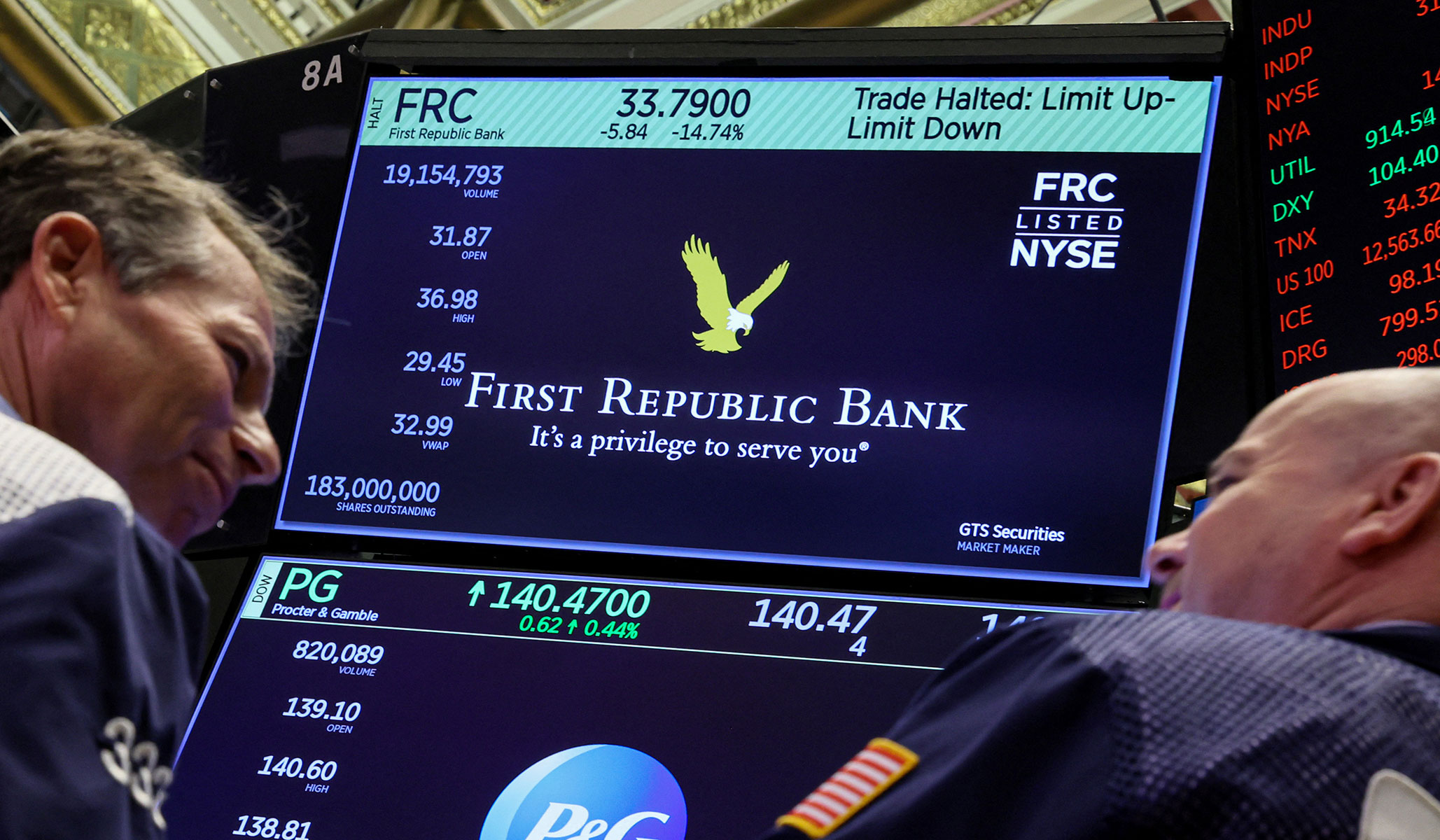


Banks, because of the nature of their business — to put it at a very basic level, they lend out much more money than they have in the till — depend to an unusual extent on confidence. If too many of a bank’s depositors want their money back at the same time, that can sink it.
It doesn’t help that pulling money out (or trying to) has now become a matter of a minute or two of a depositor’s day spent on his or her laptop. There’s no longer any need to stand in line at, say, George Bailey’s chaotically run building and loan. And for depositors with uninsured deposits, there will be a strong incentive not to wait and see. Why take the risk of staying with their existing bank when they can move their money somewhere else and not have to worry? Could that mean that a sound bank can sometimes be forced under? Yes.
A falling stock price can be a warning to depositors that a bank is in trouble. As such, it can be a useful warning sign. It can also signal to a bank’s management that trouble is brewing, trouble that they can, hopefully, head off. But that tumble in the stock price can feed the panic that, rightly or wrongly, could, in extreme cases, bring a bank down.
Stock prices will fall (obviously) if enough holders start selling, and selling pressure can be accentuated by investors shorting a stock, buying puts and so on: There are plenty of ways of speculating on a stock’s fall if investors think that a company is in trouble. And sometimes, speculators will simply pile in with a view, shall we say, of greasing that slide. In theory, other investors will see that speculative slump as based on nothing (or nothing much) and pick the stock up cheaply. But, where a bank stock is involved, depositors may have fled by then, and the damage will have been done, whether deservedly or not.
As our own banking woes continue, SEC Chairman Gary Gensler is on the case.
Federal prosecutors in Washington are looking into short seller activity around the recent volatility in U.S. bank shares sparked by the failure of three regional lenders since March, a source familiar with the matter said. Short sellers, traders that profit by betting shares will fall, have come under scrutiny over the past week as government efforts to steady the sector have faltered and investor fears over the health of regional lenders have deepened. Their activity around the banking crisis is an “area of interest” for the Justice Department, which is looking for potential securities market manipulation, the person said.
Other regulators are also assessing potential market manipulation by short sellers, Reuters reported last week, but the scrutiny by criminal prosecutors, which has not been previously reported, raises the stakes for potential wrongdoers.
U.S. Securities and Exchange Commission chair Gary Gensler and California regulators have said they are watching for any potential misconduct.
The standard for launching a formal probe is very high, and it is unclear whether prosecutors would ultimately bring any charges, the person said. A spokesperson for the Justice Department did not respond immediately to request for comment.
The KBW Regional Banking index (.KRX) has slumped 24% since the day before regulators shuttered Silicon Valley Bank, the first lender to collapse, on March 10.
The game that regulators are playing here is, I think, to scare off potential short sellers rather than any real belief that there has been any improper market manipulation.
The impression that this was a defensive operation rather than anything prompted by real evidence of wrongdoing is only reinforced by this report from the Financial Times:
JPMorgan Chase’s chief executive Jamie Dimon has called on US regulators to look into the behaviour of investors betting against bank stocks as part of official efforts to “finish” the banking turmoil.
Four lenders have failed while some hedge fund short sellers have made large profits from bets against such stocks in the past two months. Regulatory action to deal with the bank collapses has failed to halt falls in some lenders’ shares.
“The SEC has the enforcement capability to look at what people are doing by name in options, derivatives, short sales,” said Dimon in an interview with Bloomberg Television on Thursday, echoing a recent call from a US banking lobby group.
“If someone’s doing anything wrong, people are in collusion or people are going short and then making a tweet about a bank, they should go after them and vigorously,” he added.
Earlier this month the American Bankers Association called for the Securities and Exchange Commission to take measures against alleged “market manipulation”.
In a letter to the regulator the group noted “significant short sales” of several bank stocks “that do not appear to reflect the issuers’ financial status or general industry conditions”, and urged the SEC to reduce “the avenues for abusive trading” . . .
Regional banking stocks have been hit hard following the recent collapses of lenders, which began with the unexpectedly rapid disintegration of Silicon Valley Bank in March. Fellow California-based lender First Republic this month replaced it as the second-largest bank collapse in US history, with $93.5bn in assets sold to JPMorgan.
Banks including PacWest, Western Alliance and Zions Bancorp have each fallen at least 50 per cent this year.
Just over 19 per cent of PacWest’s shares are at present being borrowed for shorting, according to data from specialist consultancy S3, compared with just 4.2 per cent on loan before SVB collapsed. Short interest in Western Alliance stands at 10.5 per cent, up from 2.8 per cent.
The three most profitable positions for short sellers in the first quarter were those betting on falls for SVB, Signature Bank — which collapsed days after SVB — and First Republic, according to S3.
Whether such jawboning by regulators is appropriate (or indeed reassuring) is an interesting question.
